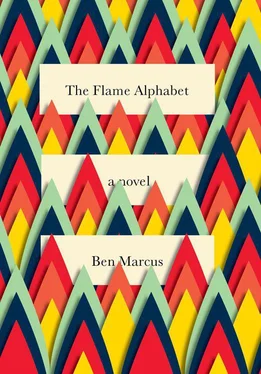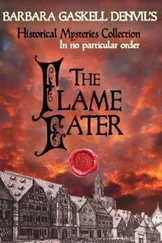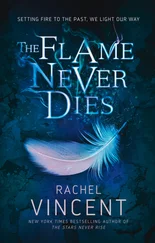I even sent down alphabets that had already been tested.
For the decoy work I faked my way to bedtime. When I did not use letters soaked with ink I used objects, mostly bones. These were brought to me in a wire basket, with a set of burnishing tools, abrasives for sanding, some picks, little chisels, a mallet.
This decoy work could not be too amateur. I thought I could go down to the courtyard myself, in person, and use a small hooked knife to slice a divot of skin from myself, then flick that skin over a subject, a language of the body, piece by piece, until I expired at the table.
Or we could perform suicide by fairy tale. Issue a classic tale to each test subject, each technician, which would include the motherfucker LeBov. We could give a fairy tale to every unnamed person of Forsythe, and then on cue, we could commence to read our little tales.
I knew the fairy tale that I would select for my last obliterating language. I knew it inside and out.
Then we could finally bring an end to this thing, a lovely end, death by reading. How many sentences in would we get? Could we get to the part where the wolf is waiting in the grandmother’s bed, or would we have collapsed in agony already? Would we miss the best part?
It was a matter of choosing which form of failure to ride out to the spectacular, bloody end.
If I produced the decoy scripts fast enough, and had them available for the technicians when they came, I had enough time to think about my real work, and this, inevitably, had to involve a complete rethinking of the Jewish script.
From my drawer I retrieved the Hebrew balloon shrapnel. The deflated letters had dried and curled over the last few days. Some of them stank of the sea. On a stretching board I revived the pieces, ladled oil into their skin until they were slick, pulled others too long until they tore, and with my molder I formed a new set of dense cubes, like square rubber erasers, with which to build, perhaps, a Hebrew letter heretofore unseen.
With this material I fussed throughout the day, doing mock-ups in ink, laying down string for patterning, making textile samples of this lettering and wrapping the material around different lengths of iron rod.
The script, when I erected it on pins and experimented with small jets of air, looked like the folds of a brain.
I staged it in arrangements that might constitute sensible order, the logic of words, but not the sort of words we’d ever use.
It was foolish, maybe, but I wouldn’t be sharing it with just anyone, and if it wasn’t harmful, then this was the work I wanted to do, these were the letters I preferred to be near. The Hebrew letter is like a form of nature. In it is the blueprint for some flower whose name I forget, and if this flower doesn’t exist yet, it will. It is said that the twenty-two Hebrew letters, if laid flat and joined properly, then submitted to the correct curves on a table stabbed with pins, would describe the cardiovascular plan of the human body. And not only that. That was child’s play.
The absolute key was that this letter would, by necessity, need to be orphaned from the flame alphabet, toxic to it and in no way capable of joining its system. No matter what else you could communicate with it, it was imperative that this letter could never indicate the Name, or be part of a word or words that did, however indirectly. It would be the flame alphabet’s bastard letter, and I knew who would be the first to receive it.
When the technicians came for my materials, I swept this work aside, passed them Dravidian syntax instead. When I thought they needed something new, I gave them some Foster, one of the more recent, specialized languages, invented solely to promote doubt and uncertainty.
If I deployed the Hebrew script in the predictable ways, using it in words we already knew, it was still too sickening to use. I had tested enough of it on myself to know. But this only suggested to me that standard forms of communication were off-limits.
I hung my secret Hebrew letter on sticks, enlarging the aperture on the pinhole over sample words. These were words that were not even clearly defined and, to my mind, could not possibly exist. Something of their design, the precise way the details of the letters converged when placed together, fused so quickly into the shape of a toxic emblem that I felt an instant chill of comprehension.
But with this comprehension did not come the crushing. My gag reflex was not triggered. I felt a mild revulsion and that is all.
This is what I wanted. It is what our old poisonous alphabet must look like to an animal. Unpromising, of no interest. If it could not be eaten or fucked, what other use could it possibly have? Ambivalence was a starting point. When I studied the letter, looked at it from every angle, I was indifferent, unmoved. I just did not care. This was, if you’ll accept the phrase, a breakthrough.
I enlarged the pinhole, allowing more language to fill my field of vision. And every day I—I’ve never used or even thought this word before—but I fucking rejoiced , because when I looked at what might be possible with this alphabet, when I spelled with it by severing it to pieces and using its parts, omitting vowels with it and some crucial consonants, and wrote the safer words with it and then deployed those words into word strings that fell just shy of forming sentences, I was not so fully blinded by sickness that I collapsed unconscious in my chair.
I may have retched, I may have felt the room spin off its moorings as if I’d suddenly been launched from my window over the countryside of Rochester, but foul as these symptoms were, they did not of themselves seem killing, which meant the Hebrew letter had more promise than anything I’d ever seen. I may have been repulsed by the script I made with it, but because it did not finally destroy me, I felt that I had the beginnings of a solution.
With this new Hebrew lettering paradigm I began work on a non-alphabet, a system revolving around one symbol that could never be used in a word, a letter that did not even exist yet, a letter whose existence was merely inferred by the other letters. This letter could fluidly receive or reject ornament, be layered or cloaked, snap open and release, and ultimately be totally disguised, but I had yet to complete the instructions, I had not actually loaned this symbol into a vocabulary, and to one of the test subjects it would look and sound too much like the alphabet that already sickened us. I imagined a single-letter alphabet, one you could hold in your hands. Not that I planned to show this thing to just anyone. This I would be keeping to myself. Myself and maybe one other person.
It would require redundancy and nonsense built in, ligatures that expressed merely noise, to soften the harshness of meaning, extend it, disguise it. I saw it as a foam I needed to add to my system, a cloaking agent. I wondered if it could be built into a person’s body, to be activated by touch, by the absence of touch. This, too, must have been tried. We did not precisely understand how to control which symbols were perceived as nonsense, and which ones suddenly came to mean something. In fact, we understood nothing.
When I finished the first prototype, an inflatable letter vacuumed of air so that it looked like a miniature collapsed building, my idea of what had been missing from the Hebrew alphabet all along, I realized that I had inadvertently constructed an artifact that was, in appearance if not in function, very nearly identical to something from our Jewish hut, an item now confiscated. A listener, a Moses Mouth. But smaller. A baby one. New to this life. I’d finally found my smallwork. I could keep something from the motherfuckers who would abuse it.
I put it in my pocket and went out.
Читать дальше











